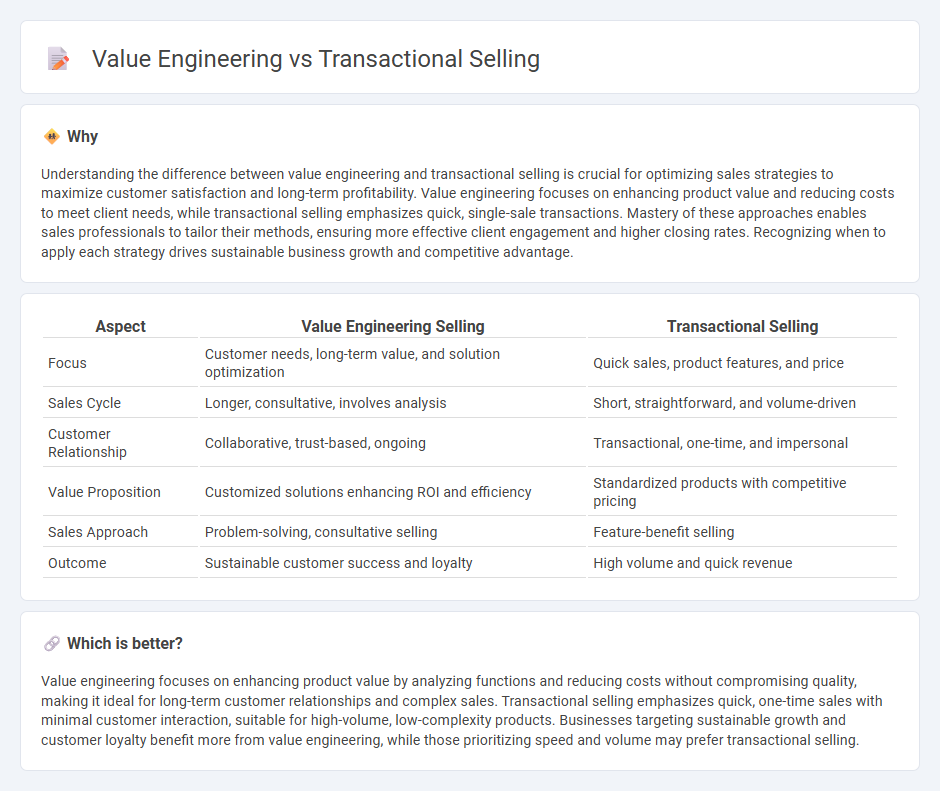
Value engineering focuses on optimizing product performance and cost-efficiency to deliver long-term benefits for clients, emphasizing tailored solutions and strategic partnership. Transactional selling prioritizes quick sales through straightforward exchanges, concentrating on price and immediate needs without deep customization. Explore how mastering both approaches can transform your sales strategy.
Why it is important
Understanding the difference between value engineering and transactional selling is crucial for optimizing sales strategies to maximize customer satisfaction and long-term profitability. Value engineering focuses on enhancing product value and reducing costs to meet client needs, while transactional selling emphasizes quick, single-sale transactions. Mastery of these approaches enables sales professionals to tailor their methods, ensuring more effective client engagement and higher closing rates. Recognizing when to apply each strategy drives sustainable business growth and competitive advantage.
Comparison Table
| Aspect | Value Engineering Selling | Transactional Selling |
|---|---|---|
| Focus | Customer needs, long-term value, and solution optimization | Quick sales, product features, and price |
| Sales Cycle | Longer, consultative, involves analysis | Short, straightforward, and volume-driven |
| Customer Relationship | Collaborative, trust-based, ongoing | Transactional, one-time, and impersonal |
| Value Proposition | Customized solutions enhancing ROI and efficiency | Standardized products with competitive pricing |
| Sales Approach | Problem-solving, consultative selling | Feature-benefit selling |
| Outcome | Sustainable customer success and loyalty | High volume and quick revenue |
Which is better?
Value engineering focuses on enhancing product value by analyzing functions and reducing costs without compromising quality, making it ideal for long-term customer relationships and complex sales. Transactional selling emphasizes quick, one-time sales with minimal customer interaction, suitable for high-volume, low-complexity products. Businesses targeting sustainable growth and customer loyalty benefit more from value engineering, while those prioritizing speed and volume may prefer transactional selling.
Connection
Value engineering enhances transactional selling by focusing on optimizing product features and costs, aligning offerings with customer needs to increase perceived value. This approach enables sales teams to present solutions that emphasize cost-effectiveness and functionality, streamlining the decision-making process in fast-paced sales environments. Integrating value engineering principles into transactional selling boosts customer satisfaction and accelerates sales cycles by delivering targeted, economically advantageous propositions.
Key Terms
Price
Transactional selling emphasizes price as the primary factor in closing deals, often resulting in competitive discounting and short-term gains. Value engineering focuses on optimizing product functionality and cost efficiency, delivering long-term savings and enhanced value rather than just low price. Explore how aligning price strategies with value-driven approaches can elevate your sales performance.
Solution
Transactional selling centers on closing deals quickly by emphasizing product features and price, aiming for immediate sales without deep customization. Value engineering prioritizes enhancing product design and functionality to reduce costs and improve value, offering tailored solutions that meet long-term client needs. Discover how integrating these approaches can optimize your solution-focused sales strategy.
ROI
Transactional selling emphasizes quick, price-focused sales often neglecting long-term benefits, while value engineering systematically improves product value by optimizing cost and functionality, directly enhancing ROI. Value engineering integrates cross-functional insights to reduce costs without compromising quality, delivering measurable financial returns that surpass transactional gains. Explore how value engineering strategies can transform your ROI for sustainable business growth.
Source and External Links
What is transactional selling, and how does this approach ... - Transactional selling is a sales strategy focused on making quick, one-time sales by emphasizing competitive pricing, purchase urgency, and social proof without building emotional connections or long-term relationships, aiming to close as many sales as possible rapidly.
Transactional selling: Strategy, definition and how it works - Transactional selling aims to drive immediate revenue by focusing on quick, one-time sales with minimal personalization or relationship-building, often using tactics like scarcity and urgency to close deals fast.
The One-Call Close: A guide to transactional sales - This sales approach prioritizes speed and efficiency, closing deals quickly with few interactions and focusing on high volume, offering value through solving immediate problems rather than long-term consultation.
 dowidth.com
dowidth.com